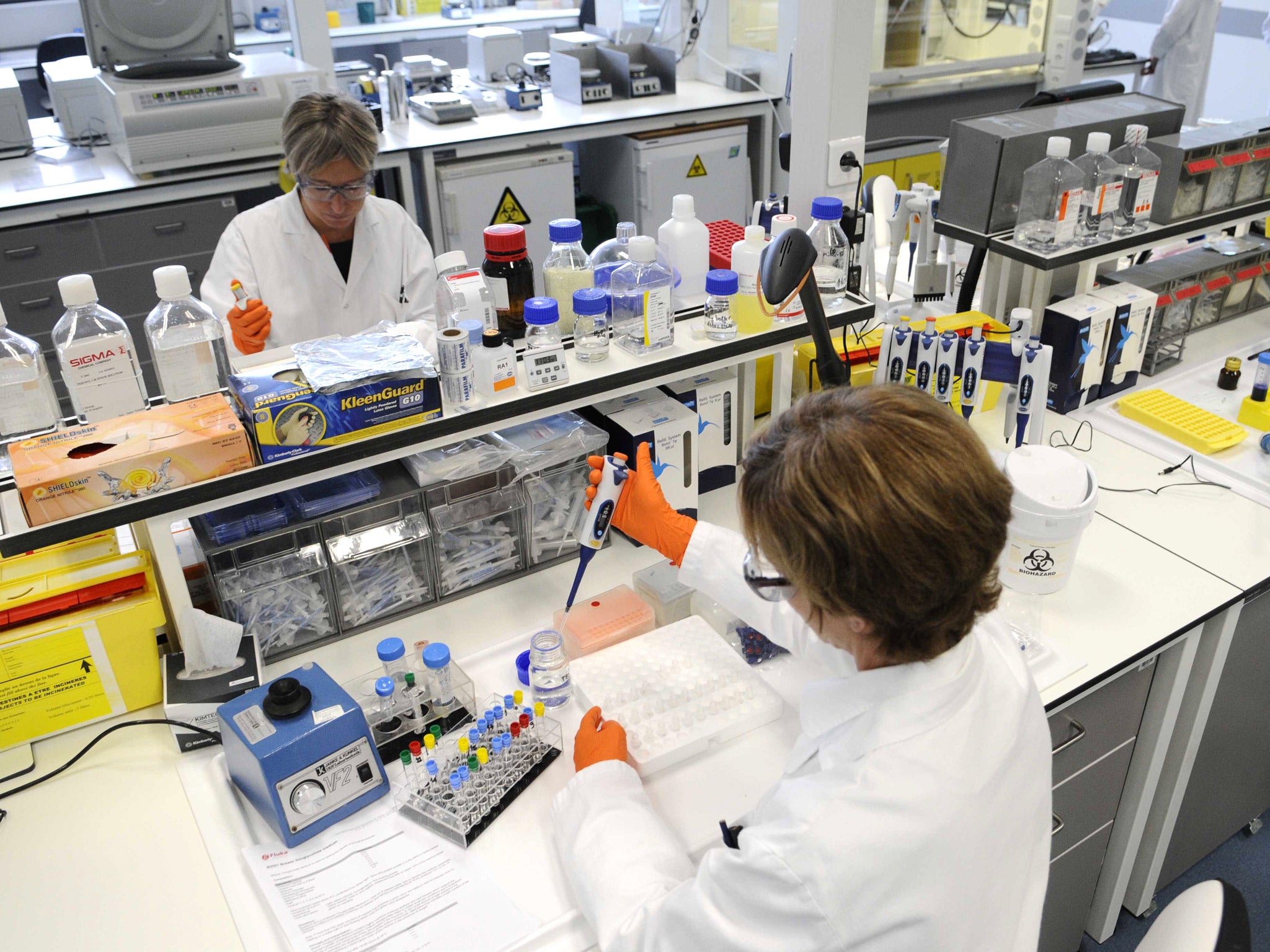‘Public-private’ deal heralds revolution in search for new drug treatments
GlaxoSmithKline and non-profit institutes hope to fast-track research into cures using patient DNA

Your support helps us to tell the story
From reproductive rights to climate change to Big Tech, The Independent is on the ground when the story is developing. Whether it's investigating the financials of Elon Musk's pro-Trump PAC or producing our latest documentary, 'The A Word', which shines a light on the American women fighting for reproductive rights, we know how important it is to parse out the facts from the messaging.
At such a critical moment in US history, we need reporters on the ground. Your donation allows us to keep sending journalists to speak to both sides of the story.
The Independent is trusted by Americans across the entire political spectrum. And unlike many other quality news outlets, we choose not to lock Americans out of our reporting and analysis with paywalls. We believe quality journalism should be available to everyone, paid for by those who can afford it.
Your support makes all the difference.Britain’s biggest drug company has signed a pioneering deal with two public research institutes to develop new medicines based on patient DNA in the hope of discovering lucrative treatments for a range of illnesses with a genetic basis, from cancer to heart disease.
GlaxoSmithKline (GSK) has promised to publicly release any early research findings for free in return for the expertise and help offered by the Wellcome Trust Sanger Institute, where the human genome was decoded, and the European Bioinformatics Institute (EBI), both based on the same campus in Cambridge.
The aim of the unique collaboration is to identify potential targets in the body for new drugs based on an analysis of the huge volumes of data generated by the human genome and similar studies into complex biological molecules such as proteins and peptides.
In return for its investment, GSK hopes to steal a march on its competitors by identifying targets early enough for it to develop drugs that have less risk of failure at the early stages of clinical trials, said Ewan Birney, associate director of the EBI and the interim head of the new Centre for Therapeutic Target Validation.
“This is about enlightened self-interest. They are funding public research to do the groundwork in the earliest stage of drug discovery. They really want to change the game for this early part of the drug-discovery process,” Dr Birney said.
“They are backing themselves that they can do the next phase and find the right drug that works better than anyone else. They realised that some things are better solved in the public domain,” he said.
One of the preconditions of the collaboration is that the research findings will be freely available, but GSK can direct the research towards areas where the company already has a commercial interest, Dr Birney said.
It is estimated that about nine out of 10 potential new drugs fail when they enter clinical trials even though they have shown promise in the laboratory and in animal trials.
Another problem is that even many licensed drugs do not work on all potential patients - some people do not respond because of their genetic makeup. It is one of the best-kept secrets of the pharmaceuticals industry that most of the drugs it makes do not work on most of the patients they are designed for.
“We are interested in knowing the proteins to target for drugs. In the case of responders and non-responders, were interested really in the new proteins in the non-responders which look like the right ones to target,” Dr Birney said.
The Sanger Institute is a world leader in decoding and analysing genome data while the EBI’s area of expertise is handling the huge volume of data generated by genome science, as well as new research in proteomics (proteins science), biochemistry and the biological basis of disease.
The centre will be built on the same site in Cambridge where the Sanger Institute is based and will initially employ about 50 researchers.
Patrick Vallance, president of pharmaceuticals research and development at GSK, said that by changing its business model and sharing information in a collaborative way, the company hopes to accelerate the development of new medicines.
“Target validation is one of the greatest challenges in drug discovery. We need to understand better the mechanisms in our body related to disease to improve how we can develop the most effective mechanisms,” Dr Vallance said.
Professor Sir Mike Stratton, director of the Sanger Institute, said: “Advances in genomics have led to a rapid increase in the availability of drug targets, providing enormous opportunity but also posing the problem of how we best convert this knowledge into medicines.
“The challenge we now address it to identify those new targets with the greatest relevance to human disease which, in turn, will undoubtedly increase the speed and efficiency in which new medicines can be developed.”
Join our commenting forum
Join thought-provoking conversations, follow other Independent readers and see their replies
Comments